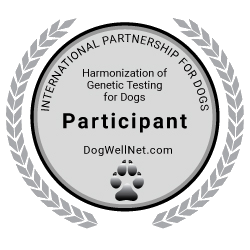Progressive Retinaatrophie (BBS2-PRA)
Typically, affected dogs show first night blindness, followed by a noticeable decline in daylight... altro
Disease
Canine progressive retinal atrophies (PRA) are genetically heterogeneous diseases characterized by retinal degeneration and subsequent blindness. While there are PRA mutations that are shared by multiple breeds, many seem to be private to a single breed or are found in breeds sharing similar ancestral backgrounds. Typical signs found by ophthalmoscopic examination are widespread tapetal hyper-reflectivity and retinal vascular attenuation. Genetic testing complements clinical eye examinations with the advantage of detecting known PRA mutations before breeding age or before clinical signs present.
In the breed Shetland Sheepdog (Shelti), a genetic variant of the Bardet-Biedl syndrome 2 (BBS2) gene has been identified that, besides to the already known CNGA1 variant, results in PRA. Typically, affected dogs show first night blindness, followed by a noticeable decline in daylight vision and, in some cases, a secondary cataract. The age of onset is vary variable, reported between 8-10 years of age. BBS proteins control the formation of primary cilia in several organs. The genetic variant of the BBS2 gene is suspected to impair retinal function by dysfunction of the phototransduction cascade. In addition to the PRA, affected dogs can show uncharacteristic features for the breed, including an upturned nose, an unusual coat texture with wavy appearance and dental defects, which are comparable conditions to a syndrome in humans called Bardet-Biedl syndrome.
In the breed Shetland Sheepdog (Shelti), a genetic variant of the Bardet-Biedl syndrome 2 (BBS2) gene has been identified that, besides to the already known CNGA1 variant, results in PRA. Typically, affected dogs show first night blindness, followed by a noticeable decline in daylight vision and, in some cases, a secondary cataract. The age of onset is vary variable, reported between 8-10 years of age. BBS proteins control the formation of primary cilia in several organs. The genetic variant of the BBS2 gene is suspected to impair retinal function by dysfunction of the phototransduction cascade. In addition to the PRA, affected dogs can show uncharacteristic features for the breed, including an upturned nose, an unusual coat texture with wavy appearance and dental defects, which are comparable conditions to a syndrome in humans called Bardet-Biedl syndrome.
Breed
Shetland Sheepdog (Sheltie)
Heredity
autosomal recessive
Test duration
1-2 weeks after arrival of the sample in the lab


